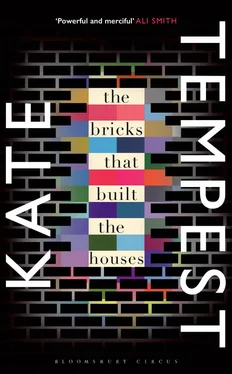Alfredo’s company excited her. When she saw him, the roof of her mouth and the bottom of her tummy ached. He was quiet like she was. He stepped carefully, like she did.
Alfredo thought that Jackie was fascinating. She was as out of place as he was, as driven and as full of pain. They sat there at the dinner table with Lily and James Peake, the friendly, wealthy, childless couple who had taken them both in.
They crossed in the hall and they felt each other’s bodies change in the proximity, some inside parts of them pushing out. Wanting to be near each other. Alfredo could feel her smallness and it made him want to carry her. He himself was a small man. Well, hardly man, a boy still.
This is how they fell in love. In their own soundless way. They barely spoke, but she slipped up to his room at night, unable to not be near him.
Quiet, desperate touching. His eyes like pits of wet, black earth, hers as blue and quick as wind.
Upstairs, in his annexe, Alfredo repeated phrases, committed text to memory, prepared himself for his entrance exam beneath the watchful, pacing mentorship of James. Downstairs, by the back door, Jackie — riddled with fear — slipped out into the night and ran and ran and ran.
She never found her uncle. She didn’t even look. Instead, she set out on her own — just another teenage girl, pregnant and alone on London’s heartless streets.
Leon grew to be a slim boy, tall as his father was short, with features like the Mayan kings he’d seen pictures of in books. He knew nothing of his parents’ meeting. Nothing of his father’s tribe. All he knew was Lewisham, his silent mother, his sisters with their different dads. His brown skin, the copper strands that grew amongst the black that girls loved to find with their fingers.
He had no idea that his father had put his life behind a calling or that he had struggled and fought for his people. All he knew was that his dad was a question he couldn’t bring up. He didn’t know the great many women and men who had carried his light from the first days, and whose light he was carrying on into the next. As far as he knew, he was all that he’d ever been.
When Leon and Harry turned thirteen, Leon, at a push, looked nine, but Harry could have passed for twenty. There was something in her face that made her seem much older than she was, and so despite her tiny frame and baby-soft skin, Harry was the only kid in the lower school that could get served cigarettes. A jackpot thing to be. It may have had something to do with the woman who worked in the shop behind the playing field. Harry walked in, awkward and angular, her clothes baggy, swaggering, her face taut with shame. The woman at the till — late twenties, smile like a bad night out, blue hair, tattooed arms — was always very kind to Harry and called her ‘gorgeous’, which made Harry’s stomach rumble uncontrollably.
Harry and Leon started selling fags to their classmates for 50p each. They could shift two packs of ten in a good lunch break and go home a tenner richer. This was back when you could get ten Sovereign for £1.25. They kept the money in a tin in Harry’s room. Locked up with a padlock that they both had a key to.
The school they went to was normal, full of sex and drugs and bullying, hysterical outbursts and dramatic confrontations. Half of Harry’s schoolmates had never seen the sea, but there wasn’t one among them that had never seen a joint.
By the time they finished school they’d sold enough fags to buy themselves half a bar of skunk. Once they started selling draw, people opened up to them. They found their social role. And then came parties, phone calls, busy days on bicycles, they were seventeen and popular. Life was theirs at last. They had something to live for, work with, throw themselves towards. By the time they were twenty, they’d turned those ounces of weed into ounces of coke, and took the risks that came along with it. As the money got more serious, they found themselves able to save and they began looking to the future. They weren’t gonna shit this money away on new clothes and gold chains. They were going to have their own place: a bar, a restaurant, a club of their own. Something that was theirs where no one could bully them and where anyone who came in would be safe.
Harry and Leon perfected their service, got the best gear and moved it without any fuss. The love they bore each other was the kind of love that flourishes best in the dismal parts of town, between friends who want more than the cheap drugs, shit sex, casual violence and eventual dullness that all their peers seemed to be settling for. A brother — sister relationship that went deeper than blood, because it was about survival and betterment and they trusted each other completely.
They were very smart and very careful; they never bought expensive things, they only sold to those they knew, had a few different numbers they used, switched the stash every other day. They were aiming for a figure, and when they got there, they’d be out. They wanted to make a million.
Leon had always had a passion for food; when he was nineteen he got a job in a kitchen and started learning how to cook. Something about the atmosphere made him feel more like himself than he’d known how to feel before. He loved the knives, the pace, the way you started with a few things and if you did it right you ended up making something so much more than the sum of its parts.
He threw himself into it, working the hours that chefs have to work. On his days off he hit the gym and trained hard. He let Harry do the bulk of the shotting. She played it sweet when she had to. She played it smart when she had to. She understood people and how to read them, and people were disarmed by her nature. She was bubbly, conversational. They trusted her judgement. Leon was the muscle. He saw danger everywhere and knew how to stop it. He would often stay hidden until the last minute.
Leon dedicated himself to being ready for anything. He trained in three different martial arts and he practised t’ai chi for strength and grace. He lifted weights, ran circuits of the park for hours. Skipped each night for forty minutes. Fought with anyone who wanted fighting with. He soon got a reputation for being a nutcase hard man. Quiet and watchful. The scariest type. But he never went for anyone unless they went for him.
After a few years, as things got busier and busier with the business, Leon threw the apron in. It was a sad day, hanging up his chef whites, but Leon was committed to Harry and the plan. And one day, when they had their own place, Leon would keep his own kitchen.
When Leon turned thirty, he looked around and noticed how, every time he saw his friends, there would come a time of night when they would be hanging off his shoulder, rubbing their eyes, telling him how unhappy they were.
‘All life is,’ they would say, elegant poets after enough lines, dabs, swigs, ‘is routine and bullshit. Nothing ever changes. Work, eat, sleep, fuck, drink, dance, die.’
But Leon had never seen life that way. Leon saw that life could be hideous or beautiful, often both, but never mediocre. He knew that every tiny thing that happened had to be considered, felt, enjoyed, either fought with or fought for.
In the kitchen they sit in silence and drink their beers for a time.
‘What’s the deal then?’ he asks her, fiddling with the sticker on his bottle.
‘Well, apparently’ — Harry looks up, raises her eyebrows — ‘it’s all going to be absolutely fine .’
Leon looks at her, sceptical. They’re going to reload, but Pico, the dealer they’ve been working with for near enough seven years, has gone to jail, and so they’re going to meet his stand-in. Leon doesn’t like it.
‘Same gear,’ Harry tells him, ‘same supplier, it’s just a new link. That’s all.’
Читать дальше












